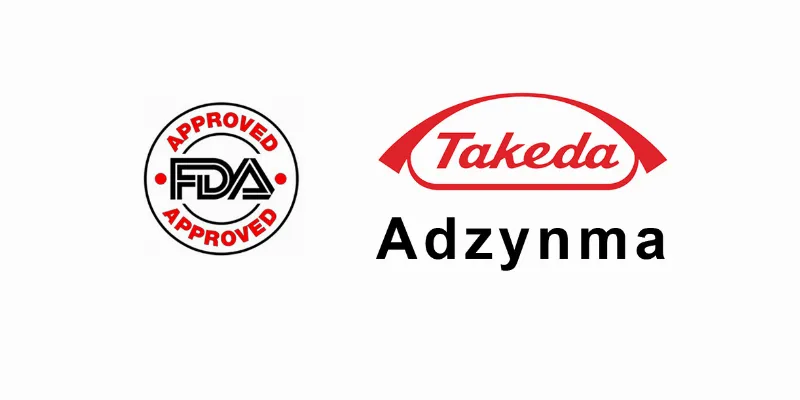FDA Approves Takeda's Adzynma as First Treatment for Rare Blood Disorder

10 November 2023
The U.S. FDA has approved Takeda's Adzynma, the first treatment for congenital thrombotic thrombocytopenic purpura (cTTP), a rare blood disorder. Adzynma, a recombinant ADAMTS13 enzyme, reduces clotting in small blood vessels, significantly lowering disease symptoms and episodes.
In a significant medical breakthrough, the U.S. Food and Drug Administration has approved Takeda Pharmaceutical's Adzynma, offering a beacon of hope for patients battling the rare genetic blood disorder, congenital thrombotic thrombocytopenic purpura (cTTP). This marks a pivotal moment in the treatment of this life-threatening condition, as Adzynma becomes the first therapy available for both adult and pediatric patients.
Understanding Congenital TTP
Congenital TTP is a rare, inherited blood clotting disorder, linked to a mutation in the ADAMTS13 gene. This gene plays a crucial role in regulating blood clotting by producing the ADAMTS13 enzyme. A deficiency in this enzyme triggers the formation of abnormal blood clots in small blood vessels throughout the body, leading to severe complications such as anemia, low platelet levels, bleeding episodes, strokes, and potential damage to vital organs.
If untreated, the disorder can be fatal. It's estimated to affect fewer than 1,000 people in the U.S., often manifesting in infancy or early childhood, though it can emerge in adulthood and sometimes first appear during pregnancy.
“The FDA remains deeply committed in our efforts to help facilitate the development and approval of safe and effective therapies for patients with rare diseases. Without treatment, cTTP is ultimately fatal. Today’s approval reflects important progress in the development of much-needed treatment options for patients affected by this life-threatening disorder,” said Peter Marks, M.D., Ph.D., director of the FDA’s Center for Biologics Evaluation and Research.
The Advent of Adzynma
Adzynma, chemically known as TAK-755, is a genetically engineered form of the ADAMTS13 enzyme. It acts by supplementing the deficient enzyme in patients, thereby mitigating the risks of clotting and bleeding. The treatment is revolutionary in its approach, providing either prophylactic or on-demand enzyme replacement therapy (ERT).

For preventive care, Adzynma is administered intravenously every other week. In situations where patients face acute events, the therapy shifts to a daily regimen. This flexibility in administration is a key aspect of its innovative design.
“In recent decades, significant progress has been made to better understand the link between ADAMTS13 deficiency and cTTP, ultimately leading to this moment where we finally have an FDA-approved treatment option for patients living with this rare disease,” said Spero R. Cataland, M.D., professor of internal medicine at the Wexner Medical Center and and ADZYNMA clinical trial investigator.
Clinical Trials and Efficacy
The FDA's approval is grounded in the results of a global study involving 46 cTTP patients. The study compared the effectiveness of Adzynma against traditional plasma-based therapies over a 12-month period, with patients initially receiving six months of treatment with one, then crossing over to the other for the remaining six months. The study conclusively demonstrated Adzynma's efficacy, notably reducing the incidence of TTP events and the need for supplemental doses.
Safety Profile and common side effects
While Adzynma's safety and effectiveness are well-established, it's important to note the most common side effects: headache, diarrhea, migraine, abdominal pain, nausea, upper respiratory tract infection, dizziness, and vomiting. No adverse events, including allergic reactions, were observed during the administration of Adzynma in clinical trials, marking a significant safety milestone.
A New Era in Treatment
The approval of Adzynma, which is expected to be commercially available by December 2023, signifies a groundbreaking advancement in the treatment of congenital TTP. The FDA's decision, further bolstered by the drug's Priority Review, Fast Track, and Orphan designations, reaffirms its commitment to facilitating the development of effective therapies for rare diseases. This development not only offers a new lifeline to patients with cTTP but also exemplifies the strides being made in genetic and enzyme replacement therapies.
As the medical community and patients await the commercial availability and pricing details of Adzynma, there's a palpable sense of optimism for those affected by this rare, life-threatening disorder. The approval of Adzynma is a testament to the relentless pursuit of medical innovation, bringing new hope to patients and families affected by rare genetic conditions.
Takeda’s ADZYNMA (ADAMTS13, recombinant-krhn) Approved by U.S. FDA as the First and Only Recombinant
ADZYNMA (ADAMTS13, recombinant-krhn) is a human recombinant “A disintegrin and metalloproteinase with thrombospondin motifs 13” ADAMTS13 (rADAMTS13) indicated for prophylactic or on-demand enzyme replacement therapy (ERT) in adult and pediatric patients with congenital thrombotic thrombocytopenic purpura (cTTP).ADZYNMA was previously granted Orphan Drug Designation (ODD) and by the U.S. FDA for the treatment and prevention of TTP, including its acquired idiopathic and secondary forms, as well as Fast Track and Rare Pediatric Disease Designation. The U.S. FDA granted Takeda a Rare Pediatric Disease Voucher for the approval of ADZYNMA. ADZYNMA has also been granted ODD by the European Medicines Agency (EMA) and Japan’s Ministry of Health, Labour and Welfare (MHLW) for the treatment of TTP.











Comments
No Comments Yet!